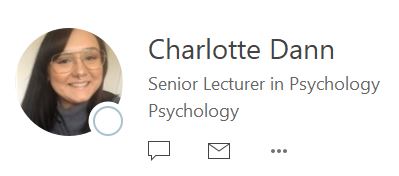Dr Charlotte Dann reflects on winning STaR Award Tech Savvy Lecturer of the Year
Reflecting on being ‘Tech Savvy’

It has come as a really pleasant surprise to be awarded Tech Savvy Lecturer of the Year, especially on the back of my Advancing Equality and Diversity Award last year. More than anything, it means a lot because this is voted for my students, and it is their recognition that really makes the difference for me.
So I’ve been thinking about what it means to be ‘tech savvy’, and I’ve considered the different kinds of tools and systems that have worked for me over the last year. And that brings me to my first reflection – finding a tool that works for you. As we are an ABL-informed campus, I want to use technology in a way that supports and enhances learning, rather than using technology just for the novelty. I’ve tried a lot of different tools over the years, but at the moment, my favourites are:
- Padlet – I really love Padlet as a tool for learning. It acts as a digital corkboard, essentially, and is great for visually capturing thoughts that can inform both in-class and online discussion. Here is an example of one of my favourites, one that I use year-on-year for in-class discussions on gender: https://en-gb.padlet.com/charlotte_dann/gender
- Google Docs – I like collaborative activities, but I appreciate that students like to collaborate in different ways. I have just a couple of examples dotted across my modules where I’ve used Google Docs to capture in-class group work, that we can discuss in live time. As the document is accessible to students, they can come back to this and reflect on it as needed after the discussion too. This is key for me in the use of technology – learning happens outside of the classroom environment, so those activities should still be available to draw on. A favourite example of an effective Google Doc is from my level 6 module Lifespan Development, but was actually based on their assignment rubric – students added their ideas as to what they needed to do to achieve each learning outcome, as organised by grade: http://bit.ly/36f4WYk
- Twitter – I am a lover of social media, though I appreciate it is not everyone’s cup of tea. On top of that, there are so many different platforms now, it’s difficult to decide which would be best to use. I favour Twitter for academic-related content (alongside dog memes), because it provides a short and sharp way of communicating, sharing, and engaging students outside of the classroom. I can share fellow academics papers, start a ‘hashtag’ discussion, or introduce students to other academics they might want to follow for updates. Though not all students use the platform, my profile is not private, so can be viewed without an account. Personally, I benefit from engaging with other academics and sharing best practice on there too. My tip, I guess, would be to find and learn about a platform that would be best for you. https://twitter.com/CharlotteJD
To wrap up, I have to acknowledge how tools are only part of the story in terms of using technology. Any time I want to try something new, or consider use in the classroom (or indeed, online learning) I ask:
- What does engagement look like?
- What is the purpose?
I like to use technology in an interactive way, so I have to consider what engagement looks like, not just for the students, but also for me. If I have a Padlet-related activity for a week, I’ll schedule out time in my diary to check it and give feedback, rather than leave it static. For the social media platforms I use (TikTok has recently taken over my life!) I plan to record and release videos daily, for consistency. And then coming to purpose – if the people that engage with the tools do not understand how it relates to the content, or see a value in it, they won’t use it. I like to make the purpose explicit, linking it to discussions we will have, or to assignments, rather than not revisiting them again.
Overall, technology, and the way we use it, is ever-evolving (even more so, taking our current worldwide situation into account). The more we share and learn from each other – students included!- the better our understanding of what works will be.
Recent Posts
- Blackboard Upgrade – March 2026
- Blackboard Upgrade – February 2026
- Blackboard Upgrade – January 2026
- Spotlight on Excellence: Bringing AI Conversations into Management Learning
- Blackboard Upgrade – December 2025
- Preparing for your Physiotherapy Apprenticeship Programme (PREP-PAP) by Fiona Barrett and Anna Smith
- Blackboard Upgrade – November 2025
- Fix Your Content Day 2025
- Blackboard Upgrade – October 2025
- Blackboard Upgrade – September 2025
Tags
ABL Practitioner Stories Academic Skills Accessibility Active Blended Learning (ABL) ADE AI Artificial Intelligence Assessment Design Assessment Tools Blackboard Blackboard Learn Blackboard Upgrade Blended Learning Blogs CAIeRO Collaborate Collaboration Distance Learning Feedback FHES Flipped Learning iNorthampton iPad Kaltura Learner Experience MALT Mobile Newsletter NILE NILE Ultra Outside the box Panopto Presentations Quality Reflection SHED Submitting and Grading Electronically (SaGE) Turnitin Ultra Ultra Upgrade Update Updates Video Waterside XerteArchives
Site Admin

